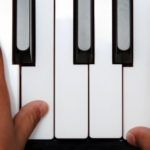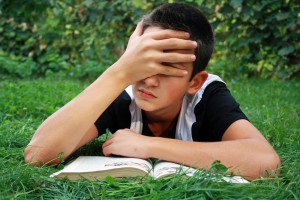
Dyslexia is a specific learning disorder characterised by difficulty with spelling and decoding words. The NHS Choices website explains that people with dyslexia typically have trouble with:

Children with dyslexia can find reading difficult due to struggling with phonological awareness.
- phonological awareness (the ability to identify the units of sound within words)
- verbal memory (the ability to remember a sequence of verbal information for a short period of time)
- verbal processing speed (the time it takes to process and recognise familiar verbal information, such as letters and digits)
Correlations between music skills, phonological awareness, and the reading development of four- and five-year-old children have been reported (Anvari 2002). Several studies have suggested benefits of musical training in domains related to language, but the results are often non-specific and contradictory.
It is therefore timely that a publication by the Cochrane Developmental, Psychosocial and Learning Problems Group analyses the evidence for the effectiveness of music education as a means of improving reading in children who have dyslexia.
What they did
The authors searched a wide range of databases for randomised controlled trials (RCT) that looked for correlations between the effectiveness of music education on the spectrum of reading skills in children and adolescents with dyslexia. They applied explicit inclusion criteria for this review, excluding studies that did not meet their criteria.
Reading skills criteria
The authors’ aims were to only include studies that investigated at least one of the following primary outcomes:

Learning to read fluently and for meaning involves the combination of range of reading skills.
- oral reading skills
- reading comprehension
- reading fluency
- phonological awareness
- spelling
Secondary outcomes were:
- self esteem
- academic performance
Music Education criteria
Generally, music education was described as the process of learning music supervised by a music teacher or a specialist in music education. A music teacher could be defined as someone who has an understanding of music elements (for example, music context, score analysis, musical style, aesthetics) and is competent to teach this to children. For inclusion in this study, eligible forms of music education were:

The reviewers decided to include research with a range of different musical activities.
- individual or group music lessons
- musical training with a music advisor or teacher at music school
- musical training at the school where the children are receiving their formal instruction, either as part of the general curriculum or as additional tuition.
The reviewers decided to include research with different types of musical activities, such as:
- singing (children singing musical passage together, in unison, or in a canon structure)
- rhythm (via corporal movement or corporal percussion)
- instrumental practice (either highly technical or informal).
What they found

Despite finding 876 citations, no studies met the criteria for inclusion in this review.
The authors search strategy initially yielded 876 citations, but none of the studies met the explicit criteria for inclusion in this review. Using the clinical condition (dyslexia) and the intervention of interest (music education) as the criteria for the study selection, six primary studies had the potential to be included since they mentioned musical education for children with dyslexia. However, the authors excluded them after looking at them in more detail, either because they were not RCTs or because they did not use any reading skill as an outcome.
The authors concluded
Implications for practice
In spite of the fact that musical education is popular and considered a beneficial intervention in the young population for the development of various cognitive skills, there is no evidence from randomised controlled trials to demonstrate potential advantages (or even disadvantages) of music education for improving reading skills, academic achievement, or self esteem in children and adolescents with dyslexia.
Implications for research
Well-designed studies with enough statistical power are needed in order to verify the effectiveness of music education for improving reading skills and academic achievement in dyslexic children and adolescents. Although music education in itself does not aim to improve reading skills, some studies showing a relationship between musical abilities and linguistic skills, and findings about neuroplasticity, suggest it is theoretically possible that music would help dyslexic children and adolescents.
The Education Elf’s View
 Despite some educators considering that music education can improve children’s reading, there is currently no gold standard evidence to support this claim. This review is methodologically sound, used appropriate selection criteria and covered a broad range of studies. The fact that none of the studies were of high enough quality to be included does not detract from the importance of the review itself.
Despite some educators considering that music education can improve children’s reading, there is currently no gold standard evidence to support this claim. This review is methodologically sound, used appropriate selection criteria and covered a broad range of studies. The fact that none of the studies were of high enough quality to be included does not detract from the importance of the review itself.
Although there is an ‘absence of evidence’ here, we must not confuse this with ‘evidence of absence’. We cannot claim that music helps improve reading skills in dyslexic young people because the evidence does not exist to prove this. However, we cannot say for sure that music education will not help children with dyslexia improve their reading skills. Randomised evidence may be published in future that shows this intervention is effective in this population.
Let’s hope some researchers rise to the challenge soon and provide us with some high-quality evidence from which we can draw conclusions. Until then, I’m off to enjoy some of the sublime and magical charms of our Elfin Orchestra…
Links
Cogo-Moreira H, Andriolo RB, Yazigi L, Ploubidis GB, Brandão de Ávila CR, Mari JJ. Music education for improving reading skills in children and adolescents with dyslexia. Cochrane Database of Systematic Reviews 2012, Issue 8. Art. No.: CD009133. DOI: 10.1002/14651858.CD009133.pub2.
Dyslexia, NHS Choices.
Anvari S, Trainor L, Woodside LJ, Levy BA. Relations among musical skills, phonological processing, and early reading ability in preschool children. Journal of Experimental Child Psychology 2002 ;83:111-30. [PubMed abstract]
